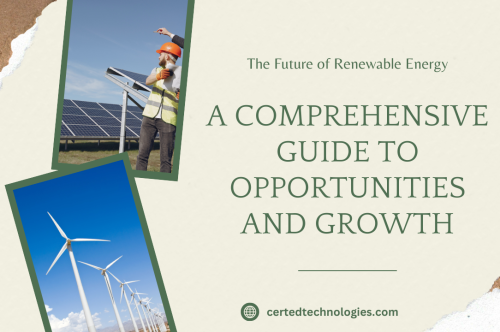The Future of Renewable Energy: A Comprehensive Guide to Opportunities and Growth

Introduction
The world is undergoing a monumental shift toward sustainable energy solutions. Renewable energy sources are at the forefront of this transformation, addressing climate change, energy security, and economic sustainability. With governments, businesses, and individuals increasingly investing in clean energy, the demand for skilled professionals in this sector is surging. This blog explores different types of renewable energy, their applications, challenges, and the vast career opportunities available in this dynamic field.
Solar Energy
Understanding Solar Energy
Solar energy utilizes sunlight to produce electricity and heat, primarily through two key technologies:
-
Photovoltaic (PV) Systems: These systems convert sunlight directly into electricity using semiconductor materials.
-
Concentrated Solar Power (CSP) Systems: Use mirrors to focus sunlight onto a receiver that generates thermal energy for electricity production.
Advantages of Solar Energy
-
Abundant and Sustainable: Sunlight is an inexhaustible resource.
-
Reduces Carbon Footprint: Significantly lowers greenhouse gas emissions.
-
Energy Independence: Minimizes dependence on fossil fuels while strengthening energy security.
-
Cost-Effective: Declining costs of solar panels make it an affordable option.
Applications of Solar Energy
-
Electricity Generation: Rooftop solar panels and large-scale solar farms.
-
Water Heating: Solar thermal systems for residential and commercial use.
-
Industrial Applications: Solar-powered manufacturing and agricultural solutions.
-
Portable Solar Solutions: Used in remote areas, military applications, and emergency response systems.
Career Opportunities in Solar Energy
-
Solar Energy Engineer: Designs and improves solar power systems.
-
Solar PV Installer: Installs and maintains solar panels.
-
Renewable Energy Consultant: Advises businesses on solar adoption.
-
Research Scientist: Works on increasing solar efficiency and battery storage.
-
Solar Policy Analyst: Helps shape regulations and policies for solar energy adoption.
Future Prospects
The solar energy sector is expanding rapidly with advancements in flexible solar panels, perovskite solar cells, and solar-integrated building materials. The global push toward net-zero emissions is further propelling investment in solar technology. Countries worldwide are incentivizing solar energy adoption, making it an integral part of the future energy landscape.
Wind Energy
Understanding Wind Energy
Wind turbines convert the kinetic energy of wind into mechanical power, which is then converted into electricity. Wind energy is categorized into:
-
Onshore Wind Farms: Land-based wind turbines used for electricity generation.
-
Offshore Wind Farms: Located in oceans or large water bodies, leveraging stronger and more consistent wind patterns.
Advantages of Wind Energy
-
Clean and Renewable: No harmful emissions during operation.
-
Scalable: Can be implemented on both large and small scales.
-
Cost-Effective: Advances in technology have significantly reduced installation and maintenance costs.
-
Job Creation: Provides employment in manufacturing, installation, and maintenance sectors.
Applications of Wind Energy
-
Power Generation: Used for residential, commercial, and industrial electricity needs.
-
Remote Areas: Wind turbines provide energy solutions in off-grid locations.
-
Hybrid Energy Systems: Often combined with solar or battery storage for uninterrupted power supply.
Career Opportunities in Wind Energy
-
Wind Turbine Technician: Installs and maintains wind turbines.
-
Aerodynamic Engineer: Designs turbine blades for optimal performance.
-
Environmental Analyst: Evaluates the ecological impact of wind farms.
-
Project Manager: Oversees wind energy projects from planning to execution.
-
Wind Resource Analyst: Studies wind patterns and site feasibility for turbine installation.
Future Prospects
Technological advancements such as floating wind turbines and hybrid solar-wind farms are making wind energy more efficient and accessible. The offshore wind market is projected to experience substantial growth in the coming decades, supported by government policies and increased investment.
Hydropower
Understanding Hydropower
Hydropower converts the movement of water into electricity using turbines. It is classified into:
-
Large-scale Hydropower: Includes major dams like the Three Gorges Dam in China.
-
Small-scale and Micro-hydro Systems: Provide localized electricity solutions.
Advantages of Hydropower
-
Reliable and Consistent: Provides steady energy output.
-
Supports Water Management: Helps with flood control and irrigation.
-
Long Lifespan: Hydropower plants have long operational durations.
Applications of Hydropower
-
Electricity Generation: Powers entire cities and industrial operations.
-
Irrigation and Water Supply: Supports agriculture and urban water systems.
-
Pumped Storage Systems: Store excess energy for peak-time electricity generation.
Career Opportunities in Hydropower
-
Hydropower Engineer: Designs and operates hydropower plants.
-
Hydrologist: Studies water flow and availability.
-
Operations Manager: Ensures efficient plant operations.
-
Environmental Consultant: Works on sustainable water management.
Future Prospects
Hydropower is evolving with innovations in pumped storage systems and fish-friendly turbines. The integration of hydropower with smart grids enhances energy stability. However, environmental concerns over dam construction necessitate sustainable practices.
Biomass Energy
Understanding Biomass Energy
Biomass energy is derived from organic materials such as wood, agricultural residues, animal waste, and other biological sources. It is considered a renewable energy source because these materials can be replenished through natural processes. Biomass can be converted into energy through various methods, including combustion, gasification, anaerobic digestion, and fermentation. The energy produced can be used for electricity generation, heating, and even biofuel production.
Common biomass sources include:
-
Wood and wood waste (e.g., sawdust, wood chips)
-
Agricultural crops and residues (e.g., corn, sugarcane, wheat straw)
-
Animal manure
-
Municipal solid waste (organic components)
-
Algae and other fast-growing biomass sources
Advantages of Biomass Energy
-
Renewable & Sustainable: Biomass is naturally replenished, making it a sustainable energy source.
-
Carbon Neutral: Plants absorb carbon dioxide (CO₂) during growth, which offsets emissions released during combustion.
-
Waste Reduction: Biomass energy helps in managing agricultural and municipal waste by converting it into usable energy.
-
Energy Security: Reduces dependence on fossil fuels and enhances local energy production.
-
Versatile Applications: Biomass can be used for electricity, heating, and biofuels.
Applications of Biomass Energy
Biomass energy is utilized across various sectors, including:
-
Electricity Generation: Biomass power plants convert organic matter into electricity through combustion or gasification.
-
Heating & Cooling: Biomass boilers and stoves are commonly used for residential and industrial heating.
-
Biofuels Production: Biomass is processed into biofuels like ethanol and biodiesel, which serve as alternatives to gasoline and diesel.
-
Industrial Uses: Biomass-based energy is employed in industries such as paper, agriculture, and food processing.
-
Biogas Production: Anaerobic digestion of organic waste produces biogas, which can be used for cooking, heating, and electricity generation.
Career Opportunities in Biomass Energy
With the growing demand for renewable energy, biomass energy offers diverse career opportunities in research, production, and operations. Key roles include:
-
Biomass Plant Operator: Oversees the operation of biomass power plants.
-
Renewable Energy Engineer: Designs and optimizes biomass energy systems.
-
Environmental Scientist: Studies the environmental impact of biomass energy production.
-
Biofuel Technician: Works on the production and refining of biofuels.
-
Waste Management Specialist: Focuses on converting organic waste into energy.
-
Research & Development (R&D) Specialist: Innovates new biomass conversion technologies.
-
Policy Analyst: Develops regulations and incentives for biomass energy adoption.
Future Prospects of Biomass Energy
The future of biomass energy is promising due to its role in sustainable development and clean energy transition. Key trends include:
-
Advanced Biofuels: Development of next-generation biofuels with higher efficiency and lower emissions.
-
Improved Biomass Technologies: Advancements in gasification, pyrolysis, and anaerobic digestion to enhance energy conversion.
-
Carbon Capture & Utilization: Integration of carbon capture technologies to make biomass energy even more sustainable.
-
Hybrid Renewable Systems: Combining biomass with solar, wind, and other renewables for a stable energy supply.
-
Government Incentives: Increasing policies and subsidies to promote biomass energy projects globally.
As the world shifts towards green energy, biomass will continue to play a crucial role in reducing carbon emissions and promoting sustainable energy solutions.
Geothermal Energy
Understanding Geothermal Energy
Geothermal energy is a renewable energy source that harnesses heat from within the Earth's crust to generate electricity and provide direct heating. The Earth's core continuously produces heat through the natural decay of radioactive elements, and this heat can be accessed through geothermal reservoirs, hot springs, and volcanic activity.
Geothermal energy is extracted using different technologies, including:
-
Geothermal Power Plants: These convert underground heat into electricity using steam or hot water.
-
Geothermal Heat Pumps: These systems utilize stable underground temperatures to provide heating and cooling for buildings.
-
Direct-Use Applications: Geothermal heat is directly used in industries, agriculture, and residential heating.
Advantages of Geothermal Energy
-
Renewable & Sustainable: The Earth’s heat is continuously replenished, making geothermal energy a long-term sustainable option.
-
Low Carbon Emissions: Unlike fossil fuels, geothermal energy has minimal greenhouse gas emissions, reducing environmental impact.
-
Reliable & Consistent: Unlike solar and wind energy, geothermal energy provides a stable, 24/7 power supply, unaffected by weather conditions.
-
Efficient Energy Source: Geothermal power plants operate with high efficiency, converting a significant portion of heat into usable energy.
-
Cost-Effective in the Long Run: Although initial setup costs can be high, geothermal energy provides long-term savings due to low operational costs.
Applications of Geothermal Energy
Geothermal energy has diverse applications across various industries, including:
-
Electricity Generation: Geothermal power plants use steam from underground reservoirs to drive turbines and generate electricity.
-
Heating and Cooling: Geothermal heat pumps provide efficient heating in winter and cooling in summer for residential and commercial buildings.
-
Agriculture & Greenhouses: Geothermal heat is used to regulate temperatures in greenhouses, improving crop growth.
-
Industrial Processes: Industries use geothermal energy for drying food, heating water, and other manufacturing processes.
-
Spa & Recreational Use: Hot springs and geothermal baths are used for health and relaxation purposes.
Career Opportunities in Geothermal Energy
As geothermal energy expands globally, numerous career opportunities are emerging in research, engineering, and operations. Some key roles include:
-
Geothermal Engineer: Designs and develops geothermal power plants and heat extraction systems.
-
Geologist & Geophysicist: Studies underground reservoirs and assesses potential geothermal sites.
-
Drilling Technician: Specializes in drilling wells to access geothermal energy sources.
-
Power Plant Operator: Oversees and manages the operations of geothermal power plants.
-
Environmental Consultant: Evaluates and mitigates the environmental impact of geothermal energy projects.
-
Renewable Energy Policy Analyst: Develops regulations and policies to promote geothermal energy.
-
Geothermal HVAC Technician: Installs and maintains geothermal heat pumps for residential and commercial buildings.
Future Prospects of Geothermal Energy
The future of geothermal energy is promising, driven by technological advancements and increasing demand for clean energy. Key trends include:
-
Enhanced Geothermal Systems (EGS): New technologies allow the extraction of geothermal energy from non-traditional locations, expanding its availability.
-
Deep Drilling Innovations: Advances in drilling technology are making deeper geothermal resources more accessible and cost-effective.
-
Integration with Other Renewables: Geothermal energy is being combined with solar and wind power to create hybrid renewable energy systems.
-
Expansion into New Markets: Countries with untapped geothermal potential are investing in infrastructure and development.
-
Government Support & Incentives: Many governments are providing subsidies and tax benefits to promote geothermal energy projects.
-
Advancements in Geothermal Heat Pumps: More efficient and affordable geothermal heating and cooling solutions are being developed for widespread adoption.
With increasing global efforts toward sustainability, geothermal energy is set to play a crucial role in the transition to a cleaner and more resilient energy future.
Tidal and Wave Energy
Tidal and wave energy are two distinct forms of ocean energy that harness the natural movements of seawater to generate electricity. These renewable energy sources have immense potential due to the vast availability of ocean resources.
Tidal Energy
Tidal energy is generated by capturing the movement of ocean tides caused by the gravitational interactions between the Earth, Moon, and Sun. The predictable rise and fall of tides create a reliable source of energy. Tidal energy is typically harnessed using:
-
Tidal Barrages: Dams built across estuaries to capture water at high tide and release it through turbines during low tide.
-
Tidal Stream Generators: Underwater turbines that generate electricity from the movement of tidal currents.
-
Dynamic Tidal Power (DTP): A large-scale concept using dams built perpendicular to coastlines to capture tidal flows.
Wave Energy
Wave energy is generated by capturing the kinetic and potential energy of ocean waves caused by wind blowing across the sea surface. The energy is extracted using devices such as:
-
Point Absorbers: Floating devices that move with waves and convert motion into electricity.
-
Oscillating Water Columns (OWC): Structures that trap air in chambers and use wave motion to generate turbine-driven power.
-
Overtopping Devices: Floating or stationary reservoirs that collect water from waves and use gravity to drive turbines.
Advantages of Tidal and Wave Energy
-
Renewable & Abundant: Oceans cover over 70% of the Earth, making tidal and wave energy an enormous untapped resource.
-
Predictable & Consistent: Tidal patterns are highly predictable compared to wind and solar energy, ensuring reliable power generation.
-
Low Carbon Emissions: Tidal and wave energy produce little to no greenhouse gas emissions, contributing to climate change mitigation.
-
Long Lifespan of Infrastructure: Tidal power plants and wave energy converters have long operational lifespans, providing a stable energy source.
-
Minimal Land Use: Unlike wind or solar farms, tidal and wave energy systems do not require significant land space.
Applications of Tidal and Wave Energy
Tidal and wave energy have diverse applications, including:
-
Electricity Generation: Used to supply renewable electricity to coastal communities and power grids.
-
Desalination: Ocean energy can be used to power desalination plants, converting seawater into fresh drinking water.
-
Coastal Protection: Wave energy devices can help mitigate coastal erosion by absorbing wave impact.
-
Aquaculture & Marine Operations: Reliable power sources for offshore fish farms, research stations, and oil rigs.
Career Opportunities in Tidal and Wave Energy
As the ocean energy sector grows, numerous career opportunities emerge in research, engineering, and operations. Key roles include:
-
Marine Engineer: Designs and develops tidal and wave energy converters.
-
Oceanographer: Studies ocean currents, waves, and tides to optimize energy extraction.
-
Renewable Energy Technician: Installs and maintains tidal and wave energy systems.
-
Environmental Scientist: Assesses and mitigates the ecological impact of ocean energy projects.
-
Hydrodynamics Specialist: Analyzes fluid dynamics to improve wave energy efficiency.
-
Project Manager: Oversees the development and execution of tidal and wave energy projects.
-
Policy & Regulatory Analyst: Develops policies and regulations to support ocean energy adoption.
Future Prospects of Tidal and Wave Energy
The future of tidal and wave energy is promising, driven by technological advancements and increasing demand for clean energy. Key trends include:
-
Improved Turbine Efficiency: Research is focused on developing more efficient underwater turbines for tidal energy.
-
Floating Wave Farms: Large-scale wave farms are being tested to provide commercial electricity generation.
-
Hybrid Renewable Systems: Integration of tidal, wave, and wind energy for stable and consistent power supply.
-
Government Support & Investments: Countries with coastal access are increasing funding for ocean energy research and deployment.
-
Eco-Friendly Designs: Innovations in bio-friendly materials and noise reduction to minimize the environmental impact of ocean energy projects.
As nations seek sustainable energy solutions, tidal and wave energy have the potential to play a crucial role in achieving a carbon-neutral future.
Conclusion
Renewable energy is not only a solution to the climate crisis but also a booming industry offering vast career prospects. With advancements in technology, declining costs, and supportive government policies, the sector is poised for exponential growth. Whether you are an engineer, scientist, business professional, or policy expert, there is a place for you in the renewable energy revolution.





